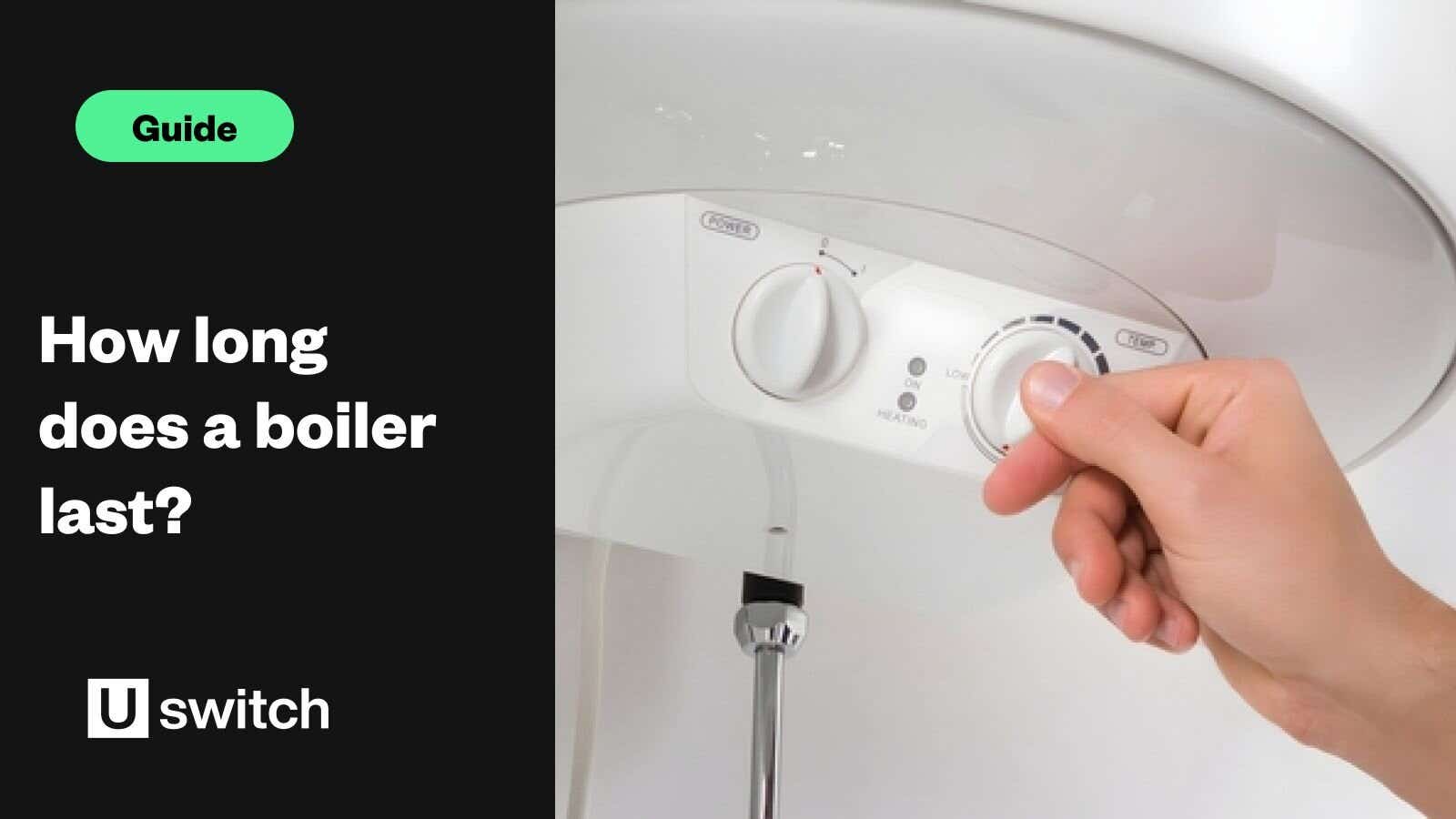How long does a boiler last?


Key takeaways
- A boiler typically lasts up to 15 years
- Lifespan depends on the type of boiler, usage and maintenance
- A biomass boiler lasts the longest but is also the most expensive to install
- Combi boilers tend to last around 10-15 years
- You can add a few years onto your boiler’s lifespan by getting it serviced annually.
What’s the average lifespan of a boiler?
A boiler typically lasts 10-15 years in an average household if it’s been regularly serviced and looked after. In some cases, boilers can go longer than 15 years and even up to 20 years.
Like other household appliances, the better you maintain it, the longer it’s expected to last. But this doesn’t mean a boiler is always going to last you 15 years even if you do get it regularly serviced. Some factors can shorten a boiler's lifespan, which we cover in this guide.
How long does a combi boiler last?
A combi boiler is one of the most popular boiler types in the UK. It provides heat and hot water without the need for a water tank or cylinder and is best for smaller homes.
If you have a combi boiler, or are thinking of getting one, it should last you around 10-15 years.
A combi boiler is highly efficient but if you start getting higher energy bills after 10 years, this could be an indication of low efficiency. If the efficiency goes down, there may not be much lifespan left in your boiler.
How long does a system boiler last?
A system boiler, best for larger households, can last 10-15 years. It works by heating water from the mains to provide hot water and central heating to your home.
With a system boiler, most of the components are integrated into the boiler which means less maintenance is required. This therefore means it’s likely to last longer.
How long does a conventional boiler last?
A conventional boiler, which is ideal for larger, older properties, can also last 10-15 years if serviced and well-maintained annually.
Conventional gas boilers from top manufacturers like Worcester Bosch come with a 12-year guarantee if installed by an accredited installer.
How long does a biomass boiler last?
Biomass boilers can be expensive to install (between £8,000-£15,000) but they have a 20-30 year lifespan and are cheaper than other heating options. Installation cost is on top of the boiler cost itself which can range from £5,000-£10,000.
A biomass boiler helps reduce carbon emissions by using wood pellets, chips or logs to generate heat.
What factors affect a boiler’s lifespan?
A boiler isn’t always guaranteed to last its full lifespan. Here are four key factors that can shorten or extend its time:
Boiler type
The type of boiler you choose, and how much you spend, can affect its lifespan. Cheaper boilers may not be better value in terms of longevity - you might have to spend more for a reliable boiler that lasts longer.
As mentioned, a biomass boiler lasts longer than other types of boilers, proving that a boiler’s lifespan depends on what type of boiler it is. A biomass boiler, however, might not be the best option for your home, so look for a boiler that works best for your property.
Boilers from popular brands like Viessmann, Vaillant or Worcester Bosch tend to last longer as they are of higher quality.
Boiler usage
It’s no surprise that the more strain a boiler is under, the shorter its lifespan.
If you overwork a boiler and put excessive pressure on the system, it could end up with frequent issues. This is why it’s important to find a boiler that’s the right fit and size for your home. If you have one that’s too small for your property, it won’t last as long due to too much pressure.
Boiler maintenance
If you want something to last a long time, you typically take good care of it. And the same should apply to boilers.
Regular boiler maintenance can help identify minor problems and prevent them becoming major issues. It also helps ensure your boiler is working efficiently.
Maintenance includes an annual boiler service which should be carried out by a qualified engineer on all key parts of your boiler. An annual service will help ensure your boiler performs well and lasts a long time. Always look for a Gas Safe registered engineer.
You may also want to consider buying boiler cover so that the cost of any repairs is covered.
Water quality
You might be surprised to know that water quality can impact a boiler’s lifespan.
Hard water is water with a higher concentration of minerals (calcium and magnesium), while soft water has a lower concentration of minerals.
Hard water can cause limescale to build up in the boiler. This then leads to corrosion of metal components, clogged pipes, and a boiler that breaks down more often.
You can check your water quality by entering your postcode on the Water UK website.
What are the signs my boiler needs to be replaced?
If your boiler is approaching the 10-year mark, it might be time to think about replacing it. Some boilers can go to 15 years, depending on how they’re used and how well they are looked after. The older your boiler, the less energy efficient it may be.
But what are the signs that it’s time for a new boiler?
Look out for:
- Frequent breakdowns - if your boiler is breaking down quite often this means it’s not in good working condition and could be at the end of its life. Always act promptly if you suspect there's a problem with your boiler.
- Increased energy bills - high energy bills mean your boiler is having to work harder to heat your home, so it’s not as efficient as it once was.
- Old age - an older boiler is more prone to issues and faults due to parts not working as well anymore.
- Leaks and noises - if your boiler is leaking or making loud or strange noises, such as gurgling, banging or whistling, there may be unresolvable problems. You may have to get a new boiler, but first call a registered engineer to check whether the boiler can be fixed.
If you notice a bad smell coming from your boiler, turn it off and contact a Gas Safe engineer as soon as possible.
How to prolong a boiler’s life
It’s not always easy getting a new boiler. According to Checkatrade, a new boiler costs around £1,500, but you can start saving up while extending your current boiler’s lifespan.
You may be able to extend the life of your existing boiler by:
- Getting it regularly serviced - book a Gas Safe engineer to check your boiler. This will help prevent any problems, keep you safe and keep your boiler in good working condition. The best time for a boiler service is usually in the summer. Many manufacturers also require an annual service in order to keep the warranty valid.
- Installing a filter - a magnetic boiler filter helps prevent blockages caused by debris and sludge that lead to breakdown. You can ask a boiler engineer to install the filter for you and then as part of the annual service, they’ll clean the filter.
- Bleed the radiators - you can improve water circulation by bleeding your radiators. This will help hot water flow properly and lower the boiler pressure (if it’s too high), improving efficiency and putting less strain on the boiler. If you are not confident about bleeding your own radiators, you can follow a YouTube tutorial or contact a local plumber for help. Try to go with a recommendation from someone you trust.
- Replacing parts of the boiler - unlike combi boilers, system boilers and standard boilers have individual parts that can fail. It’s sometimes possible to get one or more parts replaced rather than having to replace the whole boiler.
FAQs
How long do gas boilers last?
The average lifespan of a gas boiler is 10-15 years but, like any other boiler, its lifespan depends on how well it’s looked after.
Does a boiler lose efficiency as it gets older?
Yes, a boiler becomes less efficient over time. Just like other household appliances, the older it gets, the more prone it is to breakdowns and other faults that impact performance and efficiency.
How do I know how old my boiler is?
If you have recently moved to a new property, you may not know how old the boiler is. You could ask the landlord or previous owners for the boiler service history. Otherwise, you can check the boiler make, model and serial number and contact the manufacturer to ask the boiler’s age.